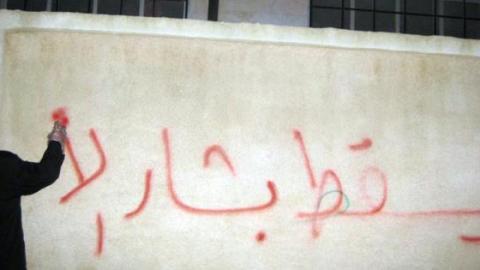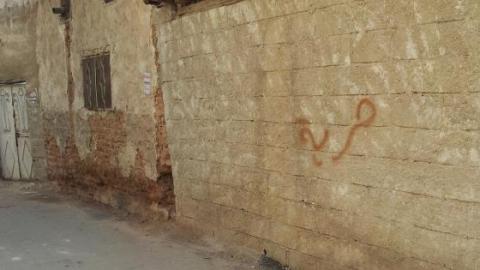“Do you know why this sign is beautiful? Because it was photographed using a cell phone.” This message, written on a banner in Tariq al-Sad, Daraa, is one of many messages shared by Syrian protesters at anti-regime demonstrations.
Despite its simplicity, the message on the sign represented a large portion of the history of the Syrian revolution that has been hidden from the eyes of the media. It describes the activists, whose names we will never know, who have used the most basic tools, in the battle against tyranny.
Hala is one of Syria’s freedom activists. She lives in Aleppo city, which did not immediately join the protest movement against President Bashar al-Assad. “I kept waiting for anti-regime activities in my area,” she said. “But unfortunately, no one held protests. I have internally rejected the regime since I was a little girl, as my father was a political prisoner, and the regime took him away from me. I felt like it was my responsibility to take part in the uprising, but I was extremely scared of arrest, especially since my father spent ten years in detention.” She added that she only felt comfortable speaking since she now lives in a liberated neighborhood. In the past she could not trust anyone, because it was hard to tell what people’s political stances were.
The activist thought a lot about what she could do. She found the answer in something many women use daily, but probably never considered as a tool to fight the regime: eyeliner.
“I bought some eyeliner, and I wore a headscarf that concealed my identity, and I began entering buildings and using the eyeliner to scrawl messages such as ‘The downfall of the regime’ on the walls,” Hala recalled.
“The first time, my heart was pounding. I felt like I was going to have a nervous breakdown.”
But she kept going, writing pro-freedom messages in different areas throughout the city.

Another example of innovation in the revolution comes from the city of Homs. Activists often use portable flash drives to easily store and share photos, videos and documents related to the revolution. They got creative in coming up with ways to keep their files hidden from regime forces - one young man even taught himself how to swallow his flash drive.
The activist used his cell phone to take videos of anti-regime demonstrations from his balcony in a neighborhood in Homs,. Using a pseudonym, he would send the videos to local coordination committees. As his collection of videos grew, he began transferring them on a flash drive.
But he remained fearful that security forces would one day raid his house and discover the flash drive. It occurred to him that, if he swallowed the small storage device, they would never find it. So he practiced swallowing and retrieving it until he mastered the skill, and he kept the flash drive in his pocket at all times for easy access in case of a raid.
Other activists in Homs searched for easy ways to share their flash drives with one another, since driving between different neighborhoods meant being stopped and searched at regime checkpoints that divided the city. Even walking through the streets came with risks, because regime snipers positioned on rooftops were known to arbitrarily shoot at passersby.
The solution? A slingshot used to shoot a flash drive from one neighborhood to another.
The activists refused to give in to the regime’s attempts to silence them and keep them from sharing their message with the world. They were aware how much their simple actions bothered and provoked security forces, and so they continued working behind the scenes.

Someone who used to work with the regime to quell protests is reported to have said, “It is easier for me to suppress one thousand protests than it is for me to pick scraps of paper up off the streets,” referring to revolutionary leaflets that activists often toss in the streets.
In order to aggravate the security forces, activists would write anti-regime slogans on one side of the paper, and messages like “Clean this up, you garbageman” on the other side.
The banner held by the Rebel Colors group at the protest in Daraa delivered one message loud and clear: We will resist this brutal dictatorship using anything we can get our hands on. We will use our pens to create words, and our words will become protest, resistance and hope.



